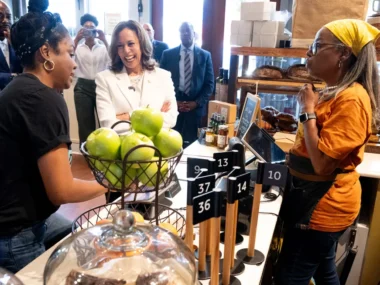The UK’s job market is showing signs of weakening, suggesting businesses are feeling the impact of rising prices and high interest rates.
The job market exhibited signs of weakening as the unemployment rate stood at 4.2% between June and August, up from 4% in the March-to-May period, though unchanged from the previous month.
The UK’s economic growth has been lackluster in recent months.
Given the current economic conditions, there is growing anticipation that interest rates will remain unchanged. The Bank of England, responsible for setting UK rates, will make its decision in November regarding whether to increase, decrease, or maintain the rate at 5.25%. In the previous meeting, the Bank opted to keep its benchmark rate steady, marking a pause after 14 consecutive rate hikes. Governor Andrew Bailey cited “increasing signs” that higher rates were beginning to impact the economy.
The Bank of England initially raised interest rates in December 2021 to curb the rise in consumer prices, known as inflation. However, this move involves a delicate balance, as excessively high rates can prompt businesses to scale back investments and hinder economic growth, potentially leading to a recession.
The most recent data for the UK economy indicates a return to growth in August, following a significant decline in July. Nonetheless, economists paint a picture of an economy that is “only just grinding forward.”
The job market exhibited signs of weakening as the unemployment rate stood at 4.2% between June and August, up from 4% in the March-to-May period, though unchanged from the previous month.
The UK’s economic growth has been lackluster in recent months.
Given the current economic conditions, there is growing anticipation that interest rates will remain unchanged. The Bank of England, responsible for setting UK rates, will make its decision in November regarding whether to increase, decrease, or maintain the rate at 5.25%. In the previous meeting, the Bank opted to keep its benchmark rate steady, marking a pause after 14 consecutive rate hikes. Governor Andrew Bailey cited “increasing signs” that higher rates were beginning to impact the economy.
The Bank of England initially raised interest rates in December 2021 to curb the rise in consumer prices, known as inflation. However, this move involves a delicate balance, as excessively high rates can prompt businesses to scale back investments and hinder economic growth, potentially leading to a recession.
The most recent data for the UK economy indicates a return to growth in August, following a significant decline in July. Nonetheless, economists paint a picture of an economy that is “only just grinding forward.”
The UK is not presently in a recession, but concerns persist regarding its weak economic growth. The economy is expected to be a central issue in the upcoming election, widely anticipated to occur next year.
Mel Stride, Secretary of State for Work and Pensions, emphasized the importance of economic growth as a “priority.” He noted that the government is introducing the next generation of welfare reforms to reduce inactivity and facilitate more people entering the workforce. Stride pointed out that there are now “over one million more people on company payrolls compared to 2019, nearing a record high.” Additionally, he mentioned that inactivity has decreased by more than a quarter of a million since the peak of the pandemic.
On the other hand, Liz Kendall, Labour’s shadow work and pensions secretary, criticized the statistics, stating that they reaffirm the “dismal mismanagement of our economy” by the Conservative party.
These newly released job figures, as of Tuesday, have been calculated with some differences by the Office for National Statistics (ONS). The ONS made these adjustments in an attempt to align the job data more closely with the actual employment landscape. The figures now incorporate the fall in the number of people employed by companies but may not capture self-employed individuals. The ONS asserts that both types of employment changes align in the short term. Universal Credit claimants were also used to update the unemployment statistics.
According to the ONS, the estimated employment rate in the UK slightly decreased to 75.7% between June and August.
Ashley Webb, a UK economist at the forecasting firm Capital Economics, interpreted the latest job figures as a sign that the labor market is “still loosening, although quite slowly.” Consequently, Webb believes that the Bank of England is likely to maintain its view that interest rates are gradually achieving their intended effect and is unlikely to raise interest rates again in the near term.











